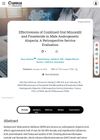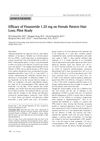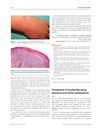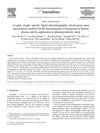 88 citations,
October 2002 in “Journal of Dermatology”
88 citations,
October 2002 in “Journal of Dermatology” Finasteride for hair loss may cause depression, affecting sleep and relationships.
 3 citations,
January 2022 in “Scientific Reports”
3 citations,
January 2022 in “Scientific Reports” A new treatment called SAMiRNA-AR68 increases hair count in people with hair loss, showing similar results to existing treatments but without side effects.

Combined oral minoxidil and finasteride significantly improve hair density in men with male pattern baldness.
 10 citations,
January 2012 in “Annals of Dermatology”
10 citations,
January 2012 in “Annals of Dermatology” Finasteride 1.25 mg showed small improvements in hair density and thickness for female pattern hair loss, but more research is needed.
 36 citations,
June 2018 in “Journal of Dermatology”
36 citations,
June 2018 in “Journal of Dermatology” Use finasteride, dutasteride, and minoxidil for hair loss treatment.
 12 citations,
January 2004 in “Reproductive biomedicine online”
12 citations,
January 2004 in “Reproductive biomedicine online” Low-dose anti-androgen drugs and certain drug combinations are effective for hirsutism, and insulin sensitizers show promise, especially for those with polycystic ovarian syndrome.
 145 citations,
November 2017 in “Journal of The European Academy of Dermatology and Venereology”
145 citations,
November 2017 in “Journal of The European Academy of Dermatology and Venereology” Use minoxidil for hair loss treatment; assess results after 6 months.
 35 citations,
May 2012 in “Expert Opinion on Pharmacotherapy”
35 citations,
May 2012 in “Expert Opinion on Pharmacotherapy” The document concludes that there are various treatments for different types of alopecia, but more research is needed for evidence-based treatments.
 33 citations,
January 2016 in “Indian Journal of Dermatology, Venereology and Leprology”
33 citations,
January 2016 in “Indian Journal of Dermatology, Venereology and Leprology” Taking 1 mg of finasteride daily can increase hair count and improve hair appearance, but it may have side effects on sexual function and a potential risk of prostate cancer. It may not be effective for postmenopausal women unless taken in higher doses.
 20 citations,
January 2014 in “Journal of the European Academy of Dermatology and Venereology”
20 citations,
January 2014 in “Journal of the European Academy of Dermatology and Venereology” The critique highlights an error in a review about hair loss treatment, stressing the need for accurate information and caution due to poor evidence quality.
 52 citations,
January 1995 in “The Journal of Clinical Endocrinology and Metabolism”
52 citations,
January 1995 in “The Journal of Clinical Endocrinology and Metabolism” Finasteride and spironolactone both reduce hirsutism, but finasteride lowers androgen levels more.
 1 citations,
May 2011 in “Journal of Human Reproductive Sciences”
1 citations,
May 2011 in “Journal of Human Reproductive Sciences” Finasteride may decrease semen quality but not harm sperm production, and stopping the drug can improve semen quality; hyperprolactinemia can cause infertility but is treatable with medication.
 75 citations,
October 1999 in “European journal of endocrinology”
75 citations,
October 1999 in “European journal of endocrinology” Finasteride is a safe, effective treatment for hirsutism with fewer side effects.
 15 citations,
March 2007 in “Journal of Pharmaceutical and Biomedical Analysis”
15 citations,
March 2007 in “Journal of Pharmaceutical and Biomedical Analysis” Method measures finasteride in plasma, suitable for pharmacokinetic studies.
 8 citations,
April 2021 in “Medical journal of the Islamic Republic of Iran”
8 citations,
April 2021 in “Medical journal of the Islamic Republic of Iran” Taking finasteride can partially improve oxygen levels in hospitalized male patients over 50 with COVID-19 pneumonia, but it doesn't affect other outcomes like death rate or hospital stay length.
 1 citations,
December 2023 in “Curēus”
1 citations,
December 2023 in “Curēus” Tadalafil is effective for treating urinary symptoms in men with BPH.
 November 2020 in “Elsevier eBooks”
November 2020 in “Elsevier eBooks” Antiandrogens and androgen inhibitors like spironolactone, finasteride, and dutasteride can treat hair loss and skin conditions, but they have risks and side effects, including potential harm to pregnant women and risks of cancer and heart issues. Herbal remedies also have antiandrogenic effects but lack safety validation.
 38 citations,
December 2010 in “Fertility and Sterility”
38 citations,
December 2010 in “Fertility and Sterility” Finasteride may cause male infertility, stopping it can help.
 11 citations,
November 2001 in “Journal of Chromatography B: Biomedical Sciences and Applications”
11 citations,
November 2001 in “Journal of Chromatography B: Biomedical Sciences and Applications” Finasteride and analogues separated using LC-MS-MS technique.
 21 citations,
May 2008 in “Talanta”
21 citations,
May 2008 in “Talanta” New, cheaper method measures finasteride in tablets accurately and quickly.
 1040 citations,
October 1992 in “The New England Journal of Medicine”
1040 citations,
October 1992 in “The New England Journal of Medicine” Finasteride effectively treats BPH but may increase sexual dysfunction risk.
 December 2024 in “Journal of the American Academy of Dermatology”
December 2024 in “Journal of the American Academy of Dermatology” Dermatologist visits offer safer and more ethical treatment for hair loss than direct-to-consumer platforms.

Topical minoxidil and oral finasteride and dutasteride are the most effective treatments for male and female pattern hair loss, but study quality varies.
 50 citations,
October 2014 in “International Journal of Clinical Pharmacology and Therapeutics”
50 citations,
October 2014 in “International Journal of Clinical Pharmacology and Therapeutics” New finasteride solution effectively reduces baldness-causing hormone, potentially with fewer side effects.
 April 2018 in “Journal of Chromatographic Science”
April 2018 in “Journal of Chromatographic Science” Finasteride's stability and safety confirmed through precise analytical methods.
 43 citations,
January 2016 in “International Journal of Andrology”
43 citations,
January 2016 in “International Journal of Andrology” Finasteride caused long-term sexual and non-sexual side effects in young men with hair loss.
 32 citations,
March 2020 in “Drug Design Development and Therapy”
32 citations,
March 2020 in “Drug Design Development and Therapy” Finasteride shows promise for female hair loss, but more research needed.
 34 citations,
January 1998 in “European Urology”
34 citations,
January 1998 in “European Urology” Finasteride works best in 6 months and lasts 6 years.
 12 citations,
May 2010 in “PubMed”
12 citations,
May 2010 in “PubMed” No definitive link between finasteride and male breast cancer, but further research is needed.
 52 citations,
June 2009 in “Current Opinion in Endocrinology, Diabetes and Obesity”
52 citations,
June 2009 in “Current Opinion in Endocrinology, Diabetes and Obesity” The document concludes that hair transplantation and gene therapy may be important for future hair loss treatment.






























